How Much Does It Cost to Groom a Golden Retriever
Puppy News
THERE IS A SHORTAGE OF PUPPIES AVAILABLE FROM REPUTABLE BREEDERS. PLEASE PLEASE BE PATIENT IN YOUR SEARCH FOR A PUPPY.
PLEASE PLEASE READ ALL OF THE INFORMATION & ADVICE BELOW. IN THE LONG RUN IT COULD SAVE YOU A LOT OF MONEY AND HEARTACHE.
Criminals continue to take advantage of the coronavirus pandemic to commit fraud, as a scam involving the purchase of pets, such as puppies and kittens, continues to be reported to Action Fraud.
So far, 669 people have lost a combined total of £282,686 in March and April 2020, after putting down deposits for pets they have seen advertised online. The adverts that victims have responded to were posted on social media, general online selling platforms and also specific pet selling platforms.
The criminals posting these ads never have any animals to sell and will ask victims to put down a deposit for the pet to secure the purchase. They use the outbreak of COVID-19 and the current lockdown restrictions as a reason why the victim cannot come and see the animal first, or pick it up. After the initial payment more and more funds will be requested to cover insurance, vaccinations and even delivery of the pet.
To help protect yourself from scams like this:
Do your research – Before purchasing anything online, including pets, look up reviews for the site, or person, you are buying from. If you're still not sure, ask a trusted friend or family member for their advice.
Trust your instinct – If you can't physically go to see the animal in person, ask for a video call. If the seller declines, challenge them on why. If you have any suspicions, don't go ahead with the purchase.
Choose your payment method wisely – If you decide to go ahead with the purchase, avoid paying by bank transfer as that offers you little protection if you become a victim of fraud. Instead, use a credit card or a payment service such as PayPal.
ONE OF THE MANY SCAMS HAS BEEN HIGHLIGHTED ON THE BBC1 PROGRAM "RIP OFF BRITIAN" EPISODE 16 AVAILABLE ON THE i PLAYER
ALSO HIGHLIGHTED ON THE "ONE SHOW" AGAIN ON THE BBC iPLAYER DATED WEDNESDAY 10TH MARCH 2021
Info on buying a puppy also feartured on Rip Off Britian 2020 Live episode 7 but only on i player for one month
ALSO
More info here: https://www.actionfraud.police.uk/…/animal-lovers-looking-f…
YOU MAY FIND IT USEFUL TO JOIN THIS FACEBOOK GROUP, BUT PLEASE BE AWARE THAT BREEDERS SHOULD NOT BE CONTACTING YOU UNTIL YOU HAVE CONTACTED THEM. FACEBOOK GROUP: Golden Retriever – Sourcing Reputable Breeders UK
ALSO CONTACT YOUR REGIONAL CLUB/S LISTED ON THIS WEB SITE FOR THEIR MEMBERS PUPPY LISTS
Buying a Puppy
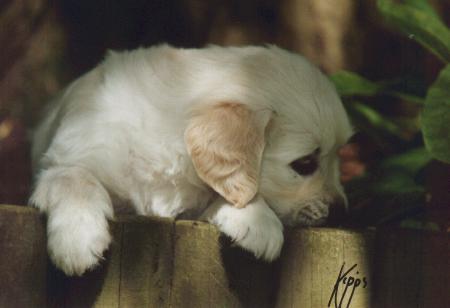
The Golden Retriever is an excellent choice for a family pet,
and though a sporting breed, it is one of the most adaptable.
A Golden can be all things to all people, from fulfilling its
original function in the shooting field, to service dog for search
and rescue, guide dog, hearing dog for the deaf and working dog
for the police and customs.
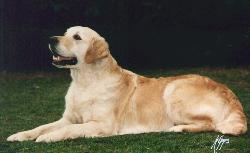
Most are intelligent, unfailingly cheerful and gentle making
them ideal companions for families with children. As family pets
they can be taught to compete successfully in obedience, agility
and working trials as well as in the show ring.
There are, however several points to bear in mind before you
purchase your new puppy.
Owning a puppy is a responsibility requiring a serious commitment
from all members of the family, for this will be a partnership
that can last anything up to 12-15 years.
Perhaps at this point we ought to remind you of a few of their
less attractive traits.
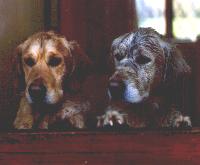
Goldens shed their coats frequently and copiously. Do not
buy one if you are house-proud, have pale coloured carpets or
a dodgy vacuum cleaner.
Goldens are large dogs with an uncanny knack of finding all the
muddiest puddles. Some are great wallowers – yours is bound to
be one of them!
Faeces are a by-product of all dogs, which we all have to dispose
of responsibly. It is one of the more unpleasant facts of dog
ownership, and most public places now require you to pick up after
your dog.
A well-bred and properly reared puppy will cost upwards of £1400
and this is only the beginning. Veterinary fees are expensive,
so it makes sense to insure your dog, indeed most breeders will
insist you do so.
A male golden retriever will mature into a large dog, reaching
as much as 24″ at the shoulder and can weigh anything up
to 80lbs – a sizeable amount when it is attempting to climb up
into your lap for a cuddle.
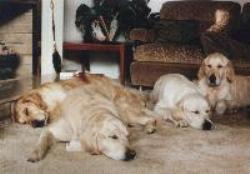 Goldens do not make good kennel dogs, most are real couch
Goldens do not make good kennel dogs, most are real couch
potatoes, who unerringly find the most comfortable sofas and
the choicest position in front of the fire.
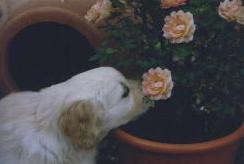
Some Goldens are great landscape architects, if your garden
is a show piece, having your own Ground Force team may not go
down too well. The garden must also be well fenced with sturdy
boundaries, like Anne Robinson, puppies will always find the
Weakest Link.
Although usually tractable and obedient, given an inch, most will
take the whole nine yards!
If you still insist that a Golden is the dog for you, read
on.
Choosing your puppy.
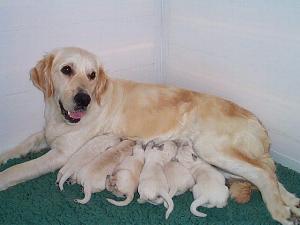 Always buy from a breeder where you can see the mother
Always buy from a breeder where you can see the mother
with her puppies. This will give you an idea of how the puppies
will turn out. If the breeder does not own the stud dog, ask
to see photographs of him.
Make sure that both the sire and the dam of the puppies have the
appropriate health clearances, and ask to see the certificates.
![]() Click on the diamond for an explanation of the health schemes.
Click on the diamond for an explanation of the health schemes.
Reputable breeders will have their puppies checked out by their
veterinary surgeon prior to sale and bear in mind you may be asked
to sign a sales contract.
Check out the puppies' living quarters. Are they scrupulously
clean? Is the breeder making provision for proper socialisation
of the litter?
Are the puppies happy and out-going, with clear eyes and skin?
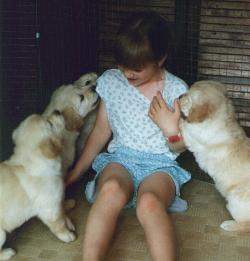
If yours is a family with very young children, do not go
for the cute, shy puppy sitting on his own in the corner. Opt
for the middle-of-the-road puppy that interacts well with his
siblings, is lively and happy without being too dominant, bold
or brash. A Golden puppy should be confident and interested to
explore his surroundings.
If colour is important to you, bear in mind the puppies will all
look considerably lighter at this age than they will end up. The
colour of their ears gives an approximate guide to their ultimate
colour. Be guided by the breeder, who will have spent many hours
with the puppies and will be able to advise you about a puppy's
temperament. What may appear to be a quiet puppy may be the life
and soul of the litter who has just had a mad half hour and worn
himself out!
Make sure you have been given all the Kennel Club documentation
and copies of all appropriate health clearances with the puppy,
an advice sheet and a diet sheet. Stick to the diet suggested
by the breeder until the puppy has settled well into his new home
before you make any changes.
Do your homework. Buy, or borrow from the library, all the books
you can on Goldens.
Puppies do not sit gift wrapped on a shelf – be prepared to wait
for the puppy of your choice.
Caring for your new puppy.
 Training should start as soon as you arrive home. Have
Training should start as soon as you arrive home. Have
one set of rules for all the family and stick to them. Puppies,
like young children, need routine and firmly established ground
rules. Goldens are good with children, but make sure your children
are taught to be caring and responsible with dogs. A puppy is
a living, breathing real-life creature, not a toy and should
be treated with respect.
Your children and your puppy.
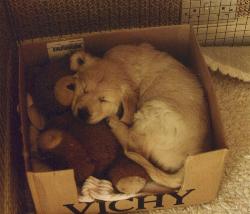 Provide the puppy with its own bed and do not allow the
Provide the puppy with its own bed and do not allow the
children to disturb the puppy when it is sleeping. The bed should
be the puppy's own private space where it can rest unmolested.
A cardboard box makes an excellent 'starter' bed and can be replaced
with a slightly larger version when chewed. Always make sure
there are no staples that the puppy could swallow.
Do not allow young children to pick up the puppy. Make sure they
are sitting on the floor and then the puppy can be placed in the
child's lap for a cuddle. Do not allow very young children to
play with the puppy unsupervised.
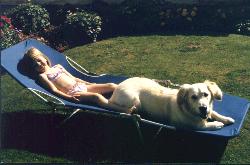 Do not allow children to become over excited around the
Do not allow children to become over excited around the
puppy. This means no screaming, no jumping and no fighting.
Do not allow young children to feed the puppy or disturb the
puppy while it is eating.
Do not allow yanking, pulling or tugging, a young puppy's bones
are delicate and not properly formed until it is several months
old. Damage done at this stage could have disastrous effects for
the rest of the puppy's life.
The First Night.
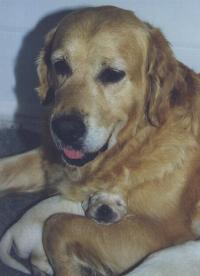
The first night is always a little fraught. It will
be the first time your puppy has been separated from his mother
and siblings, so expect him to cry a little and do not be unduly
alarmed when he does so.
Be calm and matter of fact, do not excite the puppy and make
sure it has relieved itself before putting it to bed.
Most breeders will have given you a small piece of blanket
with the scent of his family on it, that you can put inside his
bed and which will help to settle the puppy.
Provide a warm comfortable blanket such as Vet Bed, which is
hard-wearing and easily cleaned.
Place the puppy's bed in a comfortable, warm place that can
be easily cleaned, such as a kitchen or utility room. Dogs are
den animals and so prefer their bed to be tucked in a corner.
Some puppies will already be 'paper trained' by the breeder. A
couple of sheets of newspaper near the door into the garden will
give your puppy an idea of where to 'go'. Don't expect him to
be clean overnight.
Don't make the mistake of taking the puppy to bed with you, you
will make a rod for your own back!
House Training
As a rule Goldens learn quite quickly and although at times
it seems as though they will never be clean, most are by around
four months. Puppies are not really capable of controlling bladder
function much before this time, so anticipation and vigilance
on your part is of prime importance. Dogs are creatures of habit
and like to 'go' in the same place. So as soon as you arrive home
with your new pup carry him straight to the spot in the garden
and stay with him until he has performed, then make a fuss of
him, then he can go and explore his new home.
The odd accident is an inevitable part of house training your
puppy, so be prepared to experience it. Remember, prevention is
better than cure! View accidents as a lack of vigilance on your
part.
Times to watch are after a meal and a sleep. Take the puppy outside
to his spot in the garden. The use of a key word like 'Hurry up,'
helps. The actual words are irrelevant, it's the association of
the act and repetition that matters. You can use any word that
you wouldn't be embarrassed for the neighbours to overhear! An
eight-week-old puppy can spend a penny for England, so be warned!
Training.
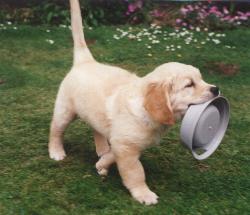
Remember that these dogs are retrievers, so it would be
going against their nature if they were never allowed to pick
things up. Many are great 'carriers' of household objects: toys
or one's arm or sleeve.
All puppies chew: It is a natural process that enables baby teeth
to be expelled. Gentle removal of an unsuitable item and substitution
of the puppy's own toy will leave your dog without any feeling
of having committed a major crime.
If anything precious gets spoiled it is your own fault.
REMEMBER – ANTICIPATION AND VIGILANCE.
Your puppy is an instinctive animal. There is no point in getting
cross if your puppy chews things if he is unsupervised for long
periods The Devil makes work for idle paws! If you do have to
be away from home for more than a couple of hours, you will need
to arrange for a puppy-sitter.
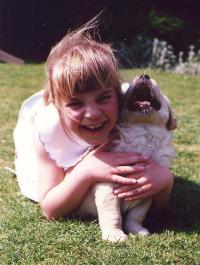
Though Goldens are usually extremely biddable and kind
to people, children and other animals, as youngsters they can
be lively and boisterous and appear to be in trouble more than
they are out of it
Your puppy has no concept of the social graces unless you teach
it, and people usually get the dogs they deserve.
We strongly recommend obedience classes for you and your puppy
to learn to become responsible members of society. Your breeder
will be able to advise you of local classes.
The very first lesson should be for the puppy to learn his
own name and to come when called. There is nothing more infuriating
than a dog that won't do so. When the pup is feeling insecure
in his new home, he won't venture far from your side. Call him
and make a fuss of him when he bounds over and give him a food
reward. he will soon get the idea and learn his name and 'come'.
Hopefully by the time he has gained the confidence to go off exploring,
the lesson will have been learnt and the thought of a treat will
bring him back.
If he won't come back, keep calm and praise him when he finally
comes, even though it may have taken him ages! If he is told off
at this point he will associate the punishment with coming to
you, not the fact that it was in his own time.
NEVER hit a young puppy; violence solves nothing and your dog
will associate pain to being with you and it will take weeks of
patience to win him round again.
Teach your puppy to accept you as his new pack-leader and that
what you say goes. Use short one-word commands, but try to make
learning fun.
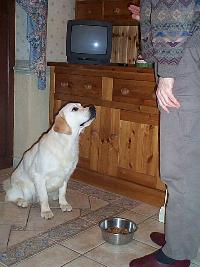
If you have a dominant, greedy puppy who guards his
food, hand feeding him for several meals often works.
If the puppy growls and guards a prized possession, remove the
article and spend time giving the item back and then gently removing
it again, until the puppy accepts your supremacy.
Exercise.
Initially, a play in your garden is quite sufficient for your
new puppy.
After he has received his vaccinations, start with 10 to 15 minutes
exercise off the lead in a safe area allowing him to set the pace.
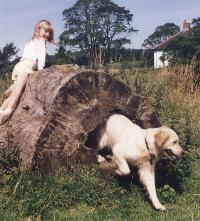
Exercise can be increased as the puppy grows, but very
gradually. Remember your puppy is growing at an alarming rate and over-exercise and too boisterous play can cause damage to joints and cartilage later on. A good way to monitor exercise is a guide of 5 minutes for each month of the puppies life, ie: at 3 month 15 minutes lead exercise twice a day, which is then increased every month by 5 minutes
Take it slowly at first, and by the time your dog is 12 to18 months old he will be able to take all the exercise you careto give him, and more.
Vaccinations.
Consult your veterinary surgeon, as vaccination programs differ between practices, but generally your puppy will receive his first injection against Parvo Virus at about 8 weeks.
The new Nobivac and Canigen vaccines out now, enable the vaccination
programs to be completed earlier, so your puppy can be socialised earlier.
Until last injection has taken effect, he should not leave
the confines of your garden, unless he is carried.
Worming.
The breeder, using a proprietary brand of wormer should have
wormed your puppy at least three times.
Even so, it makes sense to be certain that children wash their
hands after playing with the puppy and before eating.
Worm again every couple of weeks until 3 months, then once or
twice a year as a precaution.
Ask your Vet for a recommended brand of wormer.
Grooming.
Groom your puppy every day. This not only helps to keep him
clean, but also establishes a bond between the two of you.
Get your puppy used to having his ears looked at, his feet picked
up and his teeth checked on a daily basis, so that any veterinary
examination, should it be necessary at a later date, will not
be too much of an ordeal.
Initially, grooming will just consist of a thorough brushing,
though later as the adult coat and feathering comes through, a
daily check for knots and tangles will become necessary.
Keeping the feet trimmed with scissors will help to keep down
the dirt brought into the house.
And Finally.
With just a little effort and training, your puppy will mature
into a wonderful companion and a fully fledged member of the family
that you can take anywhere and whom you will be proud to own.
Don't forget to keep the breeder informed of your puppy's progress,
a photograph is always appreciated.
Should the unthinkable happen and your circumstances change
so that you are unable to keep your puppy or older dog, please
remember to inform the breeder in the first instance.
Contacts
In the UK – for a list of GRC members who currently have puppies for sale:
CLICK ON THE LINK BELOW
MEMBER PUPPY LIST
OR CONTACT:
Viv Jones, tel no: 01636 821416 email: viv.jones@talktalk.net
For a list of contact numbers for the regional Golden Retriever
Clubs in the UK,
visit the
Breed Council Site
If you feel that rather than purchase a puppy you would like
to give a home to an older dog, or if you
are unable to continue caring for your Golden, contact the
GRC Secretary,
Angela Cooper, tel no: 01299 861267 or visit our rescue
page for details of your area club.
If you live outside the UK, we would suggest you go to our
links page and contact your nearest
Golden Retriever Club.
Breeders who are members of the GRC are required to abide by
the following code of ethics:-
THE KENNEL CLUB'S
GENERAL CODE OF ETHICS FOR BREED CLUBS
All members of the Golden Retriever Club undertake
to abide by its general Code of Ethics.
Club members:
1) Will properly house, feed, water and exercise all dogs under
their care and arrange for appropriate veterinary attention if
and when required.
2) Will agree without reservation that any veterinary surgeon
performing an operation on any of their dogs which alters the
natural conformation of the animal, may report such operation
to the Kennel Club.
3) Will agree that no healthy puppy will be culled. Puppies
which may not conform to the Breed Standard should be placed
in suitable homes.
4) Will abide by all aspects of the Animal Welfare Act.
5) Will not create demand for, nor supply, puppies that have
been docked illegally.
6) Will agree not to breed from a dog or bitch which could
be in any way harmful to the dog or to the breed.
7) Will not allow any of their dogs to roam at large or to
cause a nuisance to neighbours or those carrying out official
duties.
8) Will ensure that their dogs wear properly tagged collars
and will be kept leashed or under effective control when away
from home.
9) Will clean up after their dogs in public places or anywhere
their dogs are being exhibited.
10) Will only sell dogs where there is a reasonable expectation
of a happy and healthy life and will help with the re-homing
of a dog if the initial circumstances change.
11) Will supply written details of all dietary requirements
and give guidance concerning responsible ownership when placing
dogs in a new home.
12) Will ensure that all relevant Kennel Club documents are
provided to the new owner when selling or transferring a dog,
and will agree, in writing, to forward any relevant documents
at the earliest opportunity, if not immediately available.
13) Will not sell any dog to commercial dog wholesalers, retail
pet dealers or directly or indirectly allow dogs to be given
as a prize or donation in a competition of any kind. Will not
sell by sale or auction Kennel Club registration certificates
as stand alone items (not accompanying a dog).
14) Will not knowingly misrepresent the characteristics of
the breed nor falsely advertise dogs nor mislead any person regarding
the health or quality of a dog.
Breach of these provisions may result in expulsion from club
membership, and/or disciplinary action by the Kennel Club and/or
reporting to the relevant authorities for legal action, as appropriate.
KC/GJ September 2008
How Much Does It Cost to Groom a Golden Retriever
Source: https://thegoldenretrieverclub.co.uk/puppies-page/